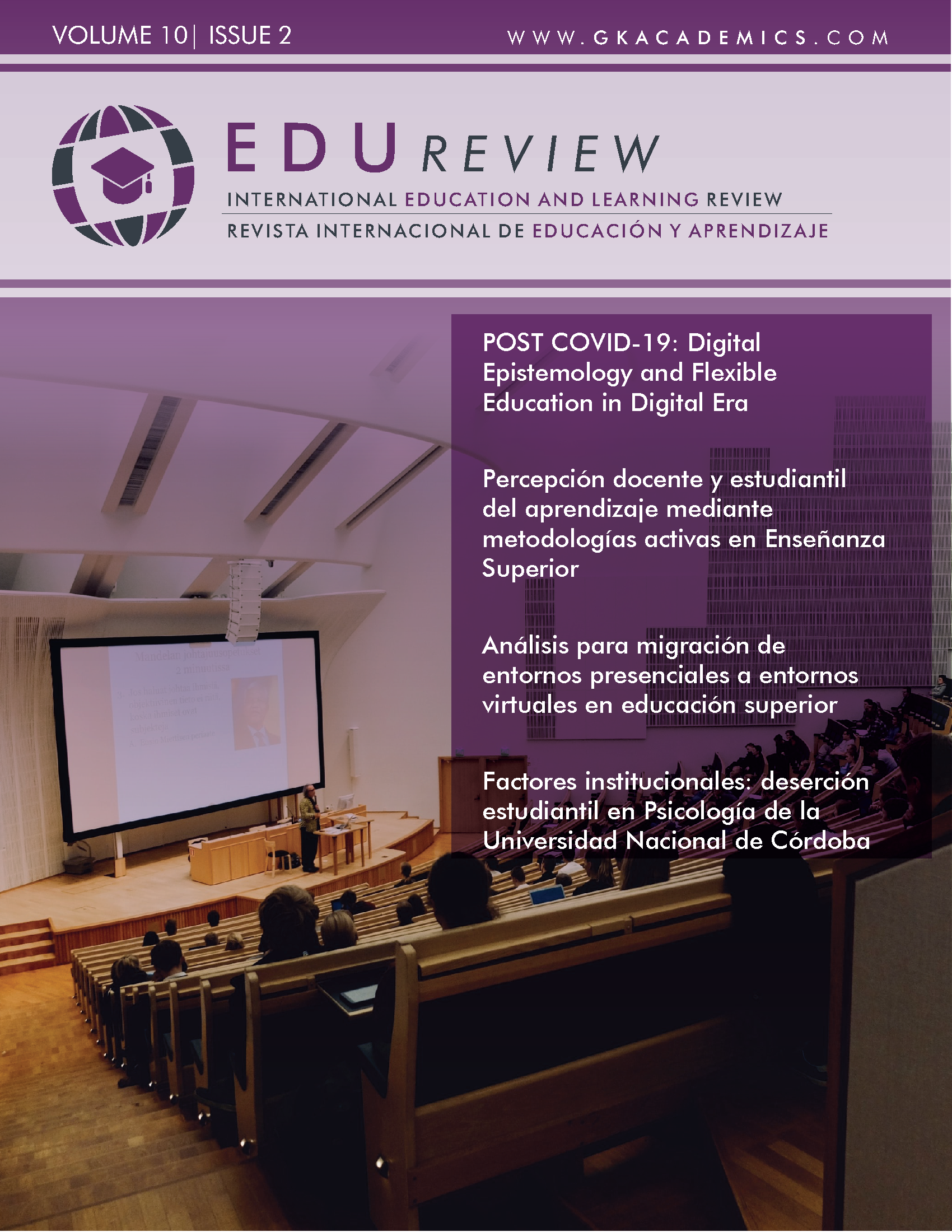POST COVID-19: Digital Epistemology and Flexible Education in Digital Era
DOI:
https://doi.org/10.37467/gkarevedu.v10.2920Keywords:
Innovation, Flexible education systems, Digital epistemology, COVID-19Abstract
This essay presents a strategy on school innovations supported by ICTs, MOOCs, and the internet in pedagogies as well as in learning modalities during and after COVID-19. A review of the literature on educational systems and innovation in educational quality and epistemology of digital education is included. Therefore, the problem is to flexibly rethink the internal processes of the school, but also to develop technological skills for both teachers and students in the transition from the traditional epistemological model to the digital one.
Downloads
Global Statistics ℹ️
|
434
Views
|
374
Downloads
|
|
808
Total
|
|
References
Aponte, G. (2015). El proceso de gestión de innovación tecnológica: sus etapas e indicadores relacionados. Revista Venezolana de Análisis de Coyuntura, XXI(1) 59-90. http://www.redalyc.org/articulo.oa?id=36442240004
Arias, E., & Cristia, J. (2014). El BID y la tecnología para mejorar el aprendizaje: ¿Cómo promover programas efectivos? Banco Interamericano de Desarrollo. https://publications.iadb.org/bitstream/handle/11319/6550/El%20BID%20y%20la%20tecnolog%C3%ADa%20para%20mejorar%20el%20aprendizaje%3A%20%C2%BFC%C3%B3mo%20promover%20programas%20efectivos%3F.pdf?sequence=1
Chavez. D. (2017, mayo 9). Innovación, una vía para estimular el crecimiento en América Latina. Banco Mundial. http://www.bancomundial.org/es/news/feature/2017/05/09/innovating-for-growth-in-latin-america
Claro, M. (2010). La incorporación de tecnologías digitales en educación: Modelos de identificación de buenas prácticas. Comisión Económica para América Latina y Caribe (CEPAL). Naciones Unidas. http://www.google.com.pe/url?sa=t&rct=j&q=&esrc=s&source=web&cd=7&cad=rja&uact=8&ved=0ahUKEwjhu__y05vUAhWFbSYKHVB-BYcQFghTMAY&url=http%3A%2F%2Frepositorio.cepal.org%2Fbitstream%2F11362%2F3772%2F1%2FS2010481.pdf&usg=AFQjCNE_oMZ14UWmuGPAxJwJ2y_tZBcs2Q
Correa, J., & Pablos. J. (2009). Nuevas tecnologías e innovación educativa. Revista de Psicodidáctica, 14(1), 133-145. https://addi.ehu.es/bitstream/handle/10810/6521/Rev.%20Psicod.%2014(1)%20-%20133-145.pdf;jsessionid=0F418DDEFD9197ED02CDA2CF1B028973?sequence=1
Edmonds, K. (2012). Young People’s Engagement in Society; How Government Policy Has Ignored the Role of Youth Work in Citizenship Education: A Critical Analysis of Britain's Future: The Citizen and the State, in the Governance of Britain Green Paper (2007). In M. Lall (Ed.), Policy, Discourse and Rhetoric: How New Labour Challenged Social Justice and Democracy (Vol. 52). Springer Science & Business Media (pp.41-56). Brill. https://brill.com/view/book/9789460918179/BP000004.xml
Hirsch, B., & Jason, W. P. (2011). Education Beyond the Cloud: Anytime-Anywhere Learning in a Smart Campus Environment. In 2011 International Conference for Internet Technology and Secured Transactions (pp. 718-723). IEEE. https://www.infona.pl/resource/bwmeta1.element.ieee-art-000006148426/tab/summary
Keating, A. (2008). The Politics of Education Policy Making and Policy Research in Europe: areas for debate and development. European Educational Research Journal, 7(3), 403-406. http://dx.doi.org/10.2304/eerj.2008.7.3.403 DOI: https://doi.org/10.2304/eerj.2008.7.3.403
Lévy, P. (2004). Inteligencia Colectiva, Humanidad emergente en el mundo del ciberespacio. Organización Panamericana de la Salud. http://www.fergut.com/pdfs/inteligencia_colectiva.pdf
Lévy, P. (2015). Inteligencia colectiva para educadores. [Presentación]. Metas educativas. La educación que queremos la generación de los bicentenarios. Organización de Estados Iberoamericanos OEI. https://www.youtube.com/watch?v=OiQ6MtHM4eM&t=794s
Marcelo, C. (2013). Las tecnologías para la innovación y la práctica docente. Revista Brasileira de Educação, 18(52), 25-47. http://www.scielo.br/pdf/rbedu/v18n52/03.pdf DOI: https://doi.org/10.1590/S1413-24782013000100003
Mateo, M. (2017 febrero 16). Más allá de la tecnología, ¿cómo se innova en educación? Banco Interamericano de Desarrollo. https://blogs.iadb.org/educacion/2017/02/16/innovacion-educacion-tecnologia/
Merejo, A. (2015). Epistemología digital. REALIS, 5(2), 156-164.
OCDE. (2014). Measuring Innovation in Education: A New Perspective, Educational Research and Innovation. Organización para la Cooperación y el Desarrollo Económico (OCDE). OCDE Publishing. http://dx.doi.org/10.1787/9789264215696-en DOI: https://doi.org/10.1787/9789264215696-en
OCDE. (2016). Innovating Education and Educating for Innovation: The Power of Digital Technologies and Skills. Organización para la Cooperación y el Desarrollo Económico (OCDE). OCDE Publishing. http://dx.doi.org/10.1787/9789264265097-en DOI: https://doi.org/10.1787/9789264265097-en
Poggi, M. (2011). Innovaciones educativas y escuelas en contextos de pobreza. Evidencias para las políticas de algunas experiencias en América Latina. Organización de las Naciones Unidas para la Educación, la Ciencia y la Cultura (UNESCO). Instituto Internacional de Planeamiento de la Educación, Sede Regional Buenos Aires. https://genbase.iiep.unesco.org/workspace/applis/epidoc/fichiers/21522_G021522.pdf
Rivas, A., & Delgado, L. E. (2017). Escuelas innovadoras en América Latina: 30 redes que enseñan y aprenden. Banco Interamericano de Desarrollo. https://publications.iadb.org/handle/11319/8254?locale-attribute=es& DOI: https://doi.org/10.18235/0000680
Ruiz Bolívar, C. (2016). El MOOC: ¿un modelo alternativo para la educación universitaria? Apertura (Guadalajara, Jal.), 7(2), 86-100. http://www.scielo.org.mx/scielo.php?script=sci_arttext&pid=S1665-61802015000200086
Sanchez-Torres, B., Rodriguez-Rodriguez, J. A., Rico-Bautista, D. W., & Guerrero, C. D. (2018). Smart Campus: Trends in Cybersecurity and Future Development. Revista Facultad de Ingeniería, 27(47), 93-101. DOI: https://doi.org/10.19053/01211129.v27.n47.2018.7807
Twani, E. (2017, mayo 5). ¿Es posible innovar el modelo educativo escolar en América Latina? [Facebook Live] Banco Interamericano de Desarrollo. https://www.facebook.com/BancoInteramericano/videos/10155368503592664/
Ursua, L. N. (2013). “e”- Epistemología: un desafío y una respuesta filosófica al mundo digital. Daimon Revista Internacional de Filosofía, (61), 55-74. https://doi.org/10.6018/daimon/155871 DOI: https://doi.org/10.6018/daimon/155871
Vargas Llosa, M. (2012 octubre 10). El peligro del libro impreso frente al digital [Video]. NewsHouston, https://www.youtube.com/watch?v=OVJTn7nHgCc
World Bank. (2020). LAC Equity Lab: Desigualdad - Distribución de Ingreso. Grupo Banco Mundial. http://www.bancomundial.org/es/topic/poverty/lac-equity-lab1/income-inequality/income-distribution
Downloads
Published
How to Cite
Issue
Section
License
Those authors who publish in this journal accept the following terms:
-
Authors retain copyright.
-
Authors transfer to the journal the right of first publication. The journal also owns the publishing rights.
-
All published contents are governed by an Attribution-NoDerivatives 4.0 International License.
Access the informative version and legal text of the license. By virtue of this, third parties are allowed to use what is published as long as they mention the authorship of the work and the first publication in this journal. If you transform the material, you may not distribute the modified work. -
Authors may make other independent and additional contractual arrangements for non-exclusive distribution of the version of the article published in this journal (e.g., inclusion in an institutional repository or publication in a book) as long as they clearly indicate that the work was first published in this journal.
- Authors are allowed and recommended to publish their work on the Internet (for example on institutional and personal websites), following the publication of, and referencing the journal, as this could lead to constructive exchanges and a more extensive and quick circulation of published works (see The Effect of Open Access).













